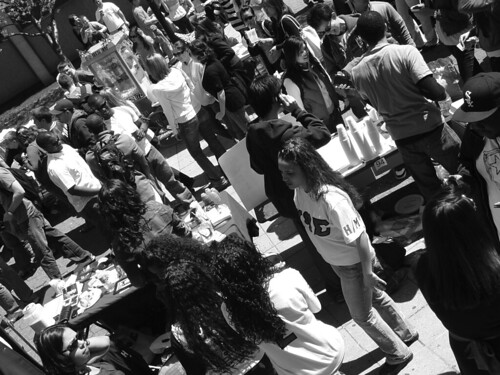
Diversity at Temple is visible to the naked eye, but how many students move past staring at a tossed salad of people and are brave enough to taste it?
These are the numbers: 55 percent of Temple students are female, 45 percent are male, 57 percent of students are white, 17 percent are African American, 10 percent are Asian, 3 percent are Latino, and international students make up another 3 percent of the university’s population.
On Main Campus, students identify themselves as Buddhists, Christians, Hindus, Muslims, atheists, agnostics, gay, straight and bisexual.
“Temple has a lot of numerical diversity, but I’m not sure if students are really engaging in deep, meaningful interactions,” said Walidah Justice, associate director of the Office of Multicultural Affairs.
“It’s a lot of different types of people in one area who have different goals and interests,” said Stephanie Do when asked what diversity means.
Do, a junior pre-pharmacy major, is a member of the Vietnamese Student Association and said she feels race is just a small part of diversity.
Before enrolling at the university, Nansi Khalil, a junior biochemistry major, said she heard Temple was a diverse school.
“I didn’t realize just how diverse it was,” she said. “Temple has an incredible range of students coming from many unique backgrounds. I was pleased to find that the Temple society includes people from all different income levels and different racial and ethnic backgrounds.”
Khalil, who is from Egypt, is a member of the Muslim Student Association and the Arab Student Association. She said she feels the diversity that Temple has is great, but she admittedly hasn’t made an effort to branch out.
“It’s important for us to appreciate people who are different from us, and it’s also important that we maintain those aspects of ourselves that make us unique,” said Alex Chambers, a senior tourism and hospitality management major and president of Temple’s chapter of Omega Psi Phi, a traditionally black fraternity. “Omega Psi Phi was founded to bring together men of color to help develop them into stronger men and build strength in the black community.”
The focus on community remains a cardinal principle of the Omegas, and the same emphasis can be found in other cultural groups on campus. Sometimes, it takes a visit outside the Temple community to begin to appreciate others.
“It’s funny, before this trip, I can’t remember really having a deep conversation with someone who wasn’t white or Jewish,” said junior Jewish studies major Pesach Kessler, treasurer for Temple Students for Israel and alumni chair of Alpha Epsilon Pi.
Along with 25 of his fraternity brothers, Kessler volunteered during his spring break at several centers in impoverished neighborhoods in Los Angeles.
“My most memorable experience was when I shared stories with the administrator of the [Watts Labor Community Action Committee], a community center where Coretta Scott-King donated many of her personal photos of her life with [Martin Luther King Jr.]. It was incredible.”
“If you look at it from a business perspective, you can really be more successful if you know how to communicate with people from different backgrounds,” said Harshil Kakadia, a member of the Dholidaz Indian Dance Club.
“Temple is a very unique place,” said Christopher Carey, associate director of the Office of Student Affairs. “It’s rare that you find an environment where you can have conversations with people from different parts of the world.”
Justice’s work with the Office of Multicultural Affairs helps to create spaces for such conversations to take place.
“College is a place where young adults are still forming their worldview and identity,” Justice said. “They can use these conversations to share their thoughts with others and have those ideas challenged.”
Justice said these conversations can influence students to form well-rounded identities of who they want to be.
The Office of Multicultural Affairs has held these kinds of talks in the past and plans to do more. One of its biggest accomplishments has been its Campus Unity Program, which brought more than 110 students from different backgrounds and organizations together for a night that featured ethnic foods and entertainment.
Student Affairs also holds programs to help facilitate diverse interactions. Some events include campus concerts and Free Food and Fun Fridays, held every Friday from 10 p.m. to 1 a.m. Last Friday’s theme was “A Night in Bollywood” and celebrated aspects of Indian culture and cinema.
Quentin Williams can be reached at quentin.williams@temple.edu.



Be the first to comment